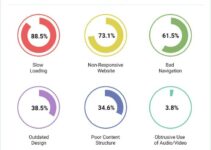Understanding small business statistics can help you expand your online business.
The sort of material you publish for clients, the manner in which people make online transactions, and the manner in which people seek for information are all continually evolving. That is why being current on the newest trends and statistics is critical to your success.
That being said, while the perfect small business ideas may lead to success for anybody looking to start their own firm, failure is all too typical.
With a global epidemic having dashed so many aspirations and ambitions, it’s now up to you to take command and focus on the success of your company.
To get you started, here is a selection of the top small business statistics that this post will give to you.
These information can assist you in making business decisions and planning.
Table of Contents
Small Business Statistics & Trends To Follow In 2024
1. Small firms make up about 90% of all enterprises worldwide (World Bank)
Small and Medium Enterprises (SMEs) account for over 90% of enterprises and 50% of jobs globally, according to the World Bank.
2. Small businesses will close in half. (Yelp)
In the present American economy,60% of small businesses are anticipated to close.
This is mostly due to the global epidemic that has hit many small firms in recent years.
With that in mind, the right smd 40% of national income in developing enterprises is also a possibility.
3. In 2020, small enterprises created 1.6 million new employment (CDN Office of Advocacy)
Small firms accounted for 99.9% of all enterprises in the United States in 2020, adding 1.6 million net new jobs throughout the year. In addition, the number of small enterprises in the United States climbed by 2.1% from 2019 to 2020.
4. About half of all small businesses begin at home. (SBA)
SBA research found that about half of all small businesses start at home, and more home-based businesses are starting up all the time. More specifically, about 60.1% of all businesses that don’t have paid employees and about 23.3% of all businesses that hire people do business from home. The most likely field for a home-based business to be in is information (70% ).
5. The main reasons why people fail (SBA)
The U.S. Small Business Administration says there are two main reasons why so many small businesses are closing.
6. About 53.7% of small-business owners have at least a bachelor’s degree (Fundera)
Even though having a degree isn’t always necessary to start a business, most small business owners have a bachelor’s degree or higher. Fundera found that 32% of the people who answered had a bachelor’s degree, 13% had a master’s degree, and 15% had some kind of college education.
7. Areas of Operation for Small Businesses (Guidant Financial)
According to a recent Guidant Financial research, the services industry has the most small company owners.
Given the fierce rivalry for people in this field, it’s quite probable that small firms will continue to struggle to stay afloat.
8. In 2019, 65 percent of entrepreneurs thought they didn’t have enough money to start a firm. (Kabbage)
According to Kabbage Inc data released in 2019, over 65% of entrepreneurs believed they did not have enough money to start their own firm. 93 percent of firm owners assessed an 18-month survival rate. According to the Kabbage survey, 58% of respondents launched their business with less than $25,000, and one-third started with less than $5,000.
Conclusion
Small enterprises are the backbone of the global economy and a crucial component of what makes the globe so adaptable.
As the small company statistics above illustrate, there’s still plenty of room for entrepreneurs to become engaged in small business sales and carve out a niche for themselves. Small enterprises will only continue to flourish in the future.




